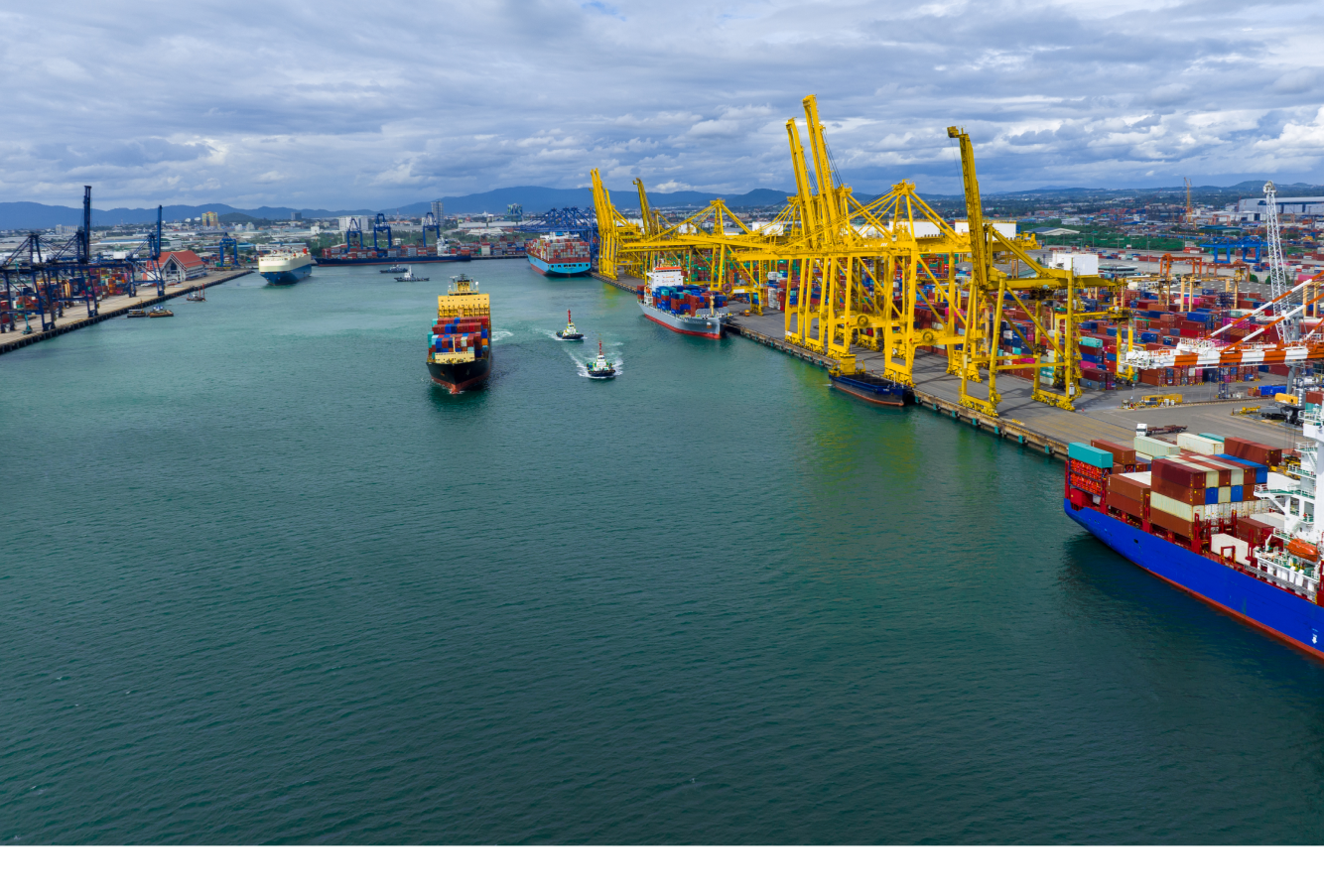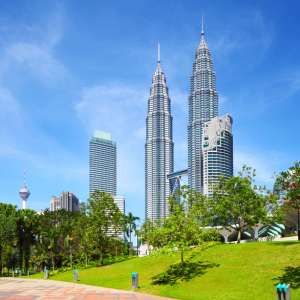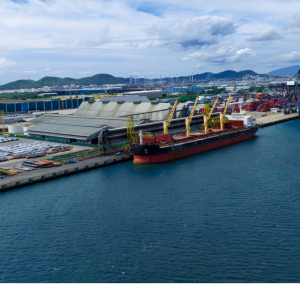A Comprehensive Guide to Shipping from Yangzhou Port to Cambodia
Latest update on 30 August, 2024 by Angelina Pang– Marketing Analyst at FreightAmigo
Leveraging China’s Maritime Prowess China’s status as a global economic powerhouse is bolstered by its robust maritime infrastructure, facilitating efficient international trade. Among the nation’s numerous strategic seaports, Yangzhou Ocean Port stands as a pivotal gateway, enabling seamless cargo transportation to diverse destinations worldwide, including the vibrant Southeast Asian nation of Cambodia. In this comprehensive guide, FreightAmigo delves into the intricate logistics of shipping from Yangzhou Port to Cambodia, equipping businesses and individuals with invaluable insights to navigate the complexities of cross-border maritime operations.
Want to Instantly Compare International Express, Air, Sea, Rail Freight And Truck Logistics Management Solutions To Control Transportation Costs?
Shipping Mode from Yangzhou Ocean Port to Cambodia
When shipping from Yangzhou Ocean Port to Cambodia, businesses have the flexibility to select from various shipping modes, each offering distinct advantages based on specific requirements and priorities. The primary shipping modes include:
Full Container Load (FCL): FCL shipping involves dedicating an entire container to a single consignment, offering enhanced security, privacy, and convenience for larger shipments. This mode is particularly suitable for businesses transporting substantial volumes of cargo or those requiring specialized handling or temperature-controlled environments.
Less than Container Load (LCL): LCL shipping consolidates multiple smaller consignments into a shared container, providing a cost-effective solution for businesses with modest shipment volumes. This mode is ideal for companies seeking to minimize transportation costs while maintaining reasonable transit times.
Air Freight: For time-sensitive shipments or high-value, low-weight cargo, air freight offers unparalleled speed and reliability. While more expensive than maritime shipping, air freight ensures rapid delivery, making it an attractive option for businesses operating under stringent deadlines or transporting perishable or urgent goods.
Multimodal Transportation: In certain scenarios, a combination of transportation modes may be employed to optimize efficiency and cost-effectiveness. For instance, cargo may be transported via ocean freight from Yangzhou Ocean Port to a regional hub, then transferred to air or land transportation for final delivery within Cambodia.
Selecting the appropriate shipping mode requires a careful evaluation of factors such as shipment size, weight, urgency, and budgetary constraints, ensuring a seamless and cost-effective logistics solution tailored to specific business needs.
Navigating Customs and Regulatory Compliance from Yangzhou Ocean Port to Cambodia
Successful cross-border shipping hinges on adherence to customs regulations and international trade laws. When shipping from Yangzhou Ocean Port to Cambodia, businesses must navigate the intricate web of customs procedures and documentation requirements mandated by both nations. Key considerations include:
Customs Documentation: Accurate and complete customs documentation is crucial to facilitate smooth cargo clearance. Essential documents may include commercial invoices, packing lists, certificates of origin, and specialized permits or licenses, depending on the nature of the shipment.
Tariffs and Duties: Understanding the applicable tariffs and duties is vital to accurately calculate shipping costs and ensure compliance. The ASEAN-China Free Trade Agreement (ACFTA) has eliminated or reduced tariffs on a significant portion of goods traded between the two regions, potentially minimizing import duties for eligible shipments.
Restricted and Prohibited Items: Certain goods, such as hazardous materials, controlled substances, or regulated products, may be subject to stringent restrictions or outright prohibitions. Businesses must thoroughly research and comply with these regulations to avoid costly delays, fines, or confiscation of their shipments.
Customs Clearance Procedures: Both China and Cambodia have established customs clearance protocols that must be adhered to for successful cargo transit. These procedures may involve submitting documentation, undergoing inspections, and obtaining necessary clearances from relevant authorities.
To navigate the complexities of customs and regulatory compliance, businesses may benefit from partnering with experienced logistics providers or customs brokers who possess in-depth knowledge of the specific requirements and can streamline the process, minimizing potential delays and ensuring compliance.
Mitigating Risks: Ensuring Cargo Security Shipping from Yangzhou Port to Cambodia
Cross-border shipping inherently carries various risks, ranging from cargo damage and theft to delays and regulatory non-compliance. Proactive risk management is essential to safeguard shipments and maintain business continuity. Key strategies for mitigating risks and ensuring cargo security include:
Proper Packaging and Handling: Adhering to industry best practices for packaging and handling can significantly reduce the risk of cargo damage during transit. Appropriate packaging materials, labeling, and handling procedures should be employed to protect shipments from external factors such as moisture, temperature fluctuations, and physical impact.
Comprehensive Insurance Coverage: Investing in comprehensive cargo insurance can provide financial protection against potential losses or damages, mitigating the financial impact of unforeseen events during transit.
Secure Cargo Tracking and Monitoring: Leveraging advanced cargo tracking and monitoring technologies can enhance visibility and security throughout the shipping process. Real-time tracking systems, tamper-evident seals, and remote monitoring devices can help detect and deter potential theft or tampering attempts.
Compliance with Security Regulations: Strict adherence to international security regulations and protocols is crucial to ensure cargo safety and prevent potential threats. This may involve implementing security measures such as container scanning, personnel screening, and adherence to supply chain security initiatives like the Customs-Trade Partnership Against Terrorism (C-TPAT) program.
Contingency Planning and Risk Mitigation Strategies: Developing comprehensive contingency plans and implementing risk mitigation strategies can help businesses respond effectively to unforeseen disruptions or emergencies during transit. This may include identifying alternative routes, establishing backup logistics providers, or implementing business continuity protocols.
By proactively addressing potential risks and implementing robust security measures, businesses can safeguard their shipments, maintain supply chain integrity, and minimize the impact of potential disruptions when shipping from Yangzhou Ocean Port to Cambodia.
Leveraging Logistics Expertise and Partnerships
Navigating the complexities of international maritime shipping can be a daunting task, particularly for businesses with limited experience or resources. Partnering with experienced logistics providers and leveraging their expertise can prove invaluable in streamlining operations and ensuring compliance with regulations. Key benefits of collaborating with logistics experts include:
Access to Global Networks and Resources: Reputable logistics providers often maintain extensive global networks, including partnerships with carriers, customs brokers, and local agents, enabling seamless end-to-end logistics solutions and facilitating efficient cargo transit.
Regulatory Compliance Guidance: Logistics experts possess in-depth knowledge of international trade regulations, customs procedures, and documentation requirements, ensuring compliance and minimizing potential delays or penalties.
Optimized Supply Chain Management: Logistics providers can offer valuable insights and strategies for optimizing supply chain processes, such as route planning, consolidation, and load optimization, leading to improved efficiency and cost savings.
Risk Mitigation and Contingency Planning: Experienced logistics partners can assist in identifying potential risks and developing contingency plans to mitigate disruptions, ensuring business continuity and supply chain resilience.
Technology Integration and Visibility: Many logistics providers offer advanced technology solutions, such as real-time tracking, automated documentation, and predictive analytics, enhancing visibility and enabling data-driven decision-making throughout the shipping process.
By leveraging the expertise and resources of reputable logistics providers, businesses can streamline their maritime shipping operations from Yangzhou Ocean Port to Cambodia, ensuring compliance, efficiency, and minimizing risks.
Leveraging Technology and Data-Driven Insights
In the modern era of digitalization, embracing technology and data-driven insights can significantly enhance the efficiency and visibility of maritime logistics operations. When shipping from Yangzhou Ocean Port to Cambodia, businesses can leverage various technological solutions to optimize their processes and gain competitive advantages:
1. Real-Time Cargo Tracking and Visibility
Implementing real-time tracking solutions, such as GPS tracking devices or integrated logistics platforms, enables businesses to monitor the precise location and status of their shipments throughout the entire journey from Yangzhou Ocean Port to Cambodia. This enhanced visibility not only provides peace of mind but also facilitates proactive decision-making and efficient coordination with customers or partners.
2. Predictive Analytics and Optimization
By leveraging advanced analytics and machine learning algorithms, businesses can gain valuable insights into historical shipping data, enabling them to identify patterns, anticipate potential disruptions, and optimize their logistics operations accordingly. Predictive analytics can assist in route planning, capacity forecasting, and risk mitigation strategies, ultimately leading to improved efficiency and cost savings.
3. Automated Documentation and Paperless Operations
Embracing digital documentation solutions can streamline administrative processes, reduce manual errors, and facilitate seamless information exchange among various stakeholders. Automated documentation systems can integrate with customs authorities, logistics providers, and internal systems, enabling paperless operations and enhancing overall supply chain transparency.
4. Internet of Things (IoT) and Sensor Technology
Integrating IoT devices and sensor technology into shipping containers or cargo holds can provide real-time monitoring of critical environmental factors, such as temperature, humidity, and shock or vibration levels. This data can be invaluable for businesses shipping perishable or sensitive goods, enabling timely interventions and ensuring product integrity throughout the journey.
5. Blockchain and Distributed Ledger Technology
Blockchain and distributed ledger technology offer enhanced security, transparency, and traceability for maritime logistics operations. By creating an immutable record of transactions and data sharing among stakeholders, businesses can streamline processes, reduce fraud risks, and establish a trusted ecosystem for cross-border trade.
By leveraging operations and Cal advancements, businesses can gain a competitive edge, optimize their operations, and provide superior service and value to their customers when shipping from Yangzhou Ocean Port to Cambodia.
Conclusion
Shipping from Yangzhou Port to Cambodia presents both opportunities and challenges for businesses engaged in international trade. By leveraging the insights and strategies outlined in this comprehensive guide, companies can navigate the complexities of maritime logistics, optimize their operations, and unlock new avenues for growth and success in the dynamic Cambodian market. Embracing innovation, collaboration, and a commitment to sustainability will be paramount in achieving long-term success in this ever-evolving landscape.
If you are looking for logistics experts, please visit FreightAmigo Page
Read More:
The Ultimate Guide to Shipping from Yangpu to Cambodia | FreightAmigo
Shipping from Jiangyin to Cambodia | FreightAmigo
A Guide to Freight From Beihai to Cambodia | FreightAmigo
If you have any inquiries on logistics / supply chain, feel free to contact FreightAmigo now:
Chat with us online | Hotline: +852 28121686 | WhatsApp: +852 27467829









































